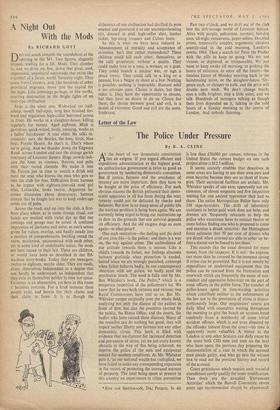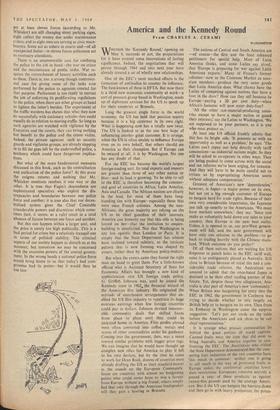Letter of the Law
The Police Under Pressure
By R. A. CLINE
AT the heart of our democratic constitution
A
lies an enigma. If you regard efficient and expeditious administration as the highest good, an authoritarian government is twice as good as government by lumbering democratic committee. But if justice, fairness and the avoidance of tyranny are more important, then they have to be bought at the price of efficiency. For such obvious reasons the British jettisoned their demo- cratic apparatus in all but form during the war; tyranny could not be defeated by checks and balances. But now in so many areas of public life the wartime problem is being born again. We are currently being urged to bring our institutions up to date on the grounds that our survival depends on efficiency. And the old enigma dogs us once again—at what price?
One such institution—the darling and the devil of our civic life—is the police: and there is a war on, the war against crime. The ambivalence of our attitude towards them is intense. Like a child's towards its father, our feelings alternate between gratitude when protection is needed, hatred when we are wrongly punished, contempt when father behaves badly. In our contemporary obsession with our police, we badly need the psychiatric touch. The need is fully met by Mr. Ben Whitaker's book, The Police,* which is a temperate inspection of the policeman's lot. We knew that he was both virtuous and vicious; two Royal Commissions have told us so. But Mr. Whitaker ranges surgically over the whole field, analysing not only the disease of the patient in front of him, but also the pressures exerted by the public, the Home Office, and the courts, the bodies who have caused those diseases. Many of the remedies can do nothing but good; they will impair neither liberty nor fairness nor any other democratic virtue. This book is filled with evidence that we clamour for increased detection and prevention of crime, yet we put every known obstacle in the way of this being achieved; we deprive the police of the men and equipment needed fOr modern conditions. As Mr. Whitaker puts it, 'as our national wealth has multiplied, we have failed to make any corresponding expansion in the means of protecting the increased amount of property. The total being spent at present in this country on experiments in crime prevention
* Eyre and Spottiswoode, 2Is.; Penguin, 3s. 6d.
is Iess than £50,000 per annum, whereas in the United States the current budget on one such project alone is $12.5 million.'
It seems scarcely credible that detectives in some areas are having to use their own cars and even bicycles because they are so short of trans- port. Their secretarial facilities are archaic. Mr. Whitaker speaks of one case, apparently not un- common, of eleven sergeants and five inspectors waiting for one ancient typewriter they had to share. The entire Metropolitan Police have only 150 tape-recorders. The drift of laboratory assistants to better-paid work does not help; and doctors are 'frequently reluctant to help the police who sometimes have to contact twelve or more before finding one who is prepared to conic and examine a drunk motorist: the Nottingham force estimates that 70 per cent of drivers who are drunk when arrested are able to sober up be- fore a doctor can be found to test them.'
This sounds like the usual demand for more money from the taxpayer. It is not: the expense can more than be covered by the immense saving if crime can be prevented. But it is not merely by expenditure or modernised equipment that the police can be rescued from the frustration and overwork which are frequently the cause of mis- conduct and oppressive behaviour on the part of sonic officers in the police force. The number of police-hours spent in time-wasting activities which contribute neither to the enforcement of the law nor to the prevention of crime is dispro- portionately large. Our magistrates' courts are daily filled with constables waiting throughout the morning to give the bench an account (read tonelessly from a notebook) of some trivial accident offence, which is not even disputed by the offender (absent from the court—his time is apparently more valuable). A visitor to the London or any other Sessions can daily count by the score both CID men and men on the beat who have spent the previous day preparing the documentation of a case in which the accused man pleads guilty, and who go into the witness box to read out the previous history and record of the accused.
Court procedures which require such wasteful attendances surely qualify for some modification. Then there are the so-called 'Extraneous Activities' which the Burrell Committee eleven years ago recommended should be abandoned;
yet at least eleven forces (according to Mr. Whitaker) are still changing street parking signs, eight collect the money due under maintenance orders, and in eight men are serving as civic mace- bearers. Some act as ushers in courts and—of all unexpected duties—in eleven forces policemen act as mortuary attendants.
There is an unanswerable case for confining the police to the job in hand—the war on crime and the maintenance of public order. War re- quires the retrenchment of luxury activities such as these. There is, too, a strong though controver- sial case for giving some of the tasks now performed by the police to agencies created for that purpose. Parliament is too ready to entrust the job of enforcing its proliferating regulations to the police, when there are other groups at hand to lighten the latter's burden. The experiment of the traffic wardens has shown that what they now do successfully with stationary vehicles they could equally do in,relation to moving traffic. So long as such agencies are watched with vigilance by the Executive and the courts, they can bring nothing but benefit to the police and the crime victim. Indeed, the private agencies such as security guards and vigilantes groups, are already stepping in to fill the gaps left by the understaffed police, a tendency which could have dangerous implica- tions.
But what of the more fundamental measures discussed in this book, such as the centralisation and unification of the police force? At this point the enigma returns and nothing that Mr. Whitaker mentions resolves it one way or the other. It is true that Fagin's descendants are sophisticated specialists who exploit the dis- crepancies and boundaries between one police force and another; it is true also that our decen- tralised system gives the Chief Constable considerable powers and discretions which some- times (not, it seems, as a rule) result in a total absence of liaison between one force and another.
But this can happen within a larger unit, and the price is surely too high politically. This is a bad period for crime but a relatively tranquil one in terms of political stability. The criminal aspects of our society happen to disturb us at the moment; but tomorrow we may be concerned with the excessive powers of the central govern- ment. In the wrong hands a national police force would bring home to us that today's bad com- promise had its points—but it would then be too late.















































 Previous page
Previous page